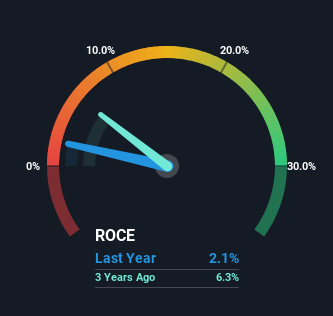Lechwerke (FRA:LEC) Will Be Looking To Turn Around Its Returns
What underlying fundamental trends can indicate that a company might be in decline? Businesses in decline often have two underlying trends, firstly, a declining return on capital employed (ROCE) and a declining base of capital employed. This indicates to us that the business is not only shrinking the size of its net assets, but its returns are falling as well. In light of that, from a first glance at Lechwerke (FRA:LEC), we've spotted some signs that it could be struggling, so let's investigate.
Understanding Return On Capital Employed (ROCE)
For those who don't know, ROCE is a measure of a company's yearly pre-tax profit (its return), relative to the capital employed in the business. Analysts use this formula to calculate it for Lechwerke:
Return on Capital Employed = Earnings Before Interest and Tax (EBIT) ÷ (Total Assets - Current Liabilities)
0.021 = €14m ÷ (€1.7b - €1.0b) (Based on the trailing twelve months to June 2023).
Therefore, Lechwerke has an ROCE of 2.1%. In absolute terms, that's a low return and it also under-performs the Electric Utilities industry average of 7.2%.
View our latest analysis for Lechwerke
Historical performance is a great place to start when researching a stock so above you can see the gauge for Lechwerke's ROCE against it's prior returns. If you're interested in investigating Lechwerke's past further, check out this free graph covering Lechwerke's past earnings, revenue and cash flow.
What The Trend Of ROCE Can Tell Us
The trend of ROCE at Lechwerke is showing some signs of weakness. The company used to generate 5.5% on its capital five years ago but it has since fallen noticeably. On top of that, the business is utilizing 59% less capital within its operations. The combination of lower ROCE and less capital employed can indicate that a business is likely to be facing some competitive headwinds or seeing an erosion to its moat. If these underlying trends continue, we wouldn't be too optimistic going forward.
On a side note, Lechwerke's current liabilities have increased over the last five years to 60% of total assets, effectively distorting the ROCE to some degree. If current liabilities hadn't increased as much as they did, the ROCE could actually be even lower. And with current liabilities at these levels, suppliers or short-term creditors are effectively funding a large part of the business, which can introduce some risks.
In Conclusion...
To see Lechwerke reducing the capital employed in the business in tandem with diminishing returns, is concerning. It should come as no surprise then that the stock has fallen 19% over the last five years, so it looks like investors are recognizing these changes. With underlying trends that aren't great in these areas, we'd consider looking elsewhere.
If you'd like to know more about Lechwerke, we've spotted 2 warning signs, and 1 of them is potentially serious.
While Lechwerke isn't earning the highest return, check out this free list of companies that are earning high returns on equity with solid balance sheets.
Have feedback on this article? Concerned about the content? Get in touch with us directly. Alternatively, email editorial-team (at) simplywallst.com.
This article by Simply Wall St is general in nature. We provide commentary based on historical data and analyst forecasts only using an unbiased methodology and our articles are not intended to be financial advice. It does not constitute a recommendation to buy or sell any stock, and does not take account of your objectives, or your financial situation. We aim to bring you long-term focused analysis driven by fundamental data. Note that our analysis may not factor in the latest price-sensitive company announcements or qualitative material. Simply Wall St has no position in any stocks mentioned.

 Yahoo Finance
Yahoo Finance 
